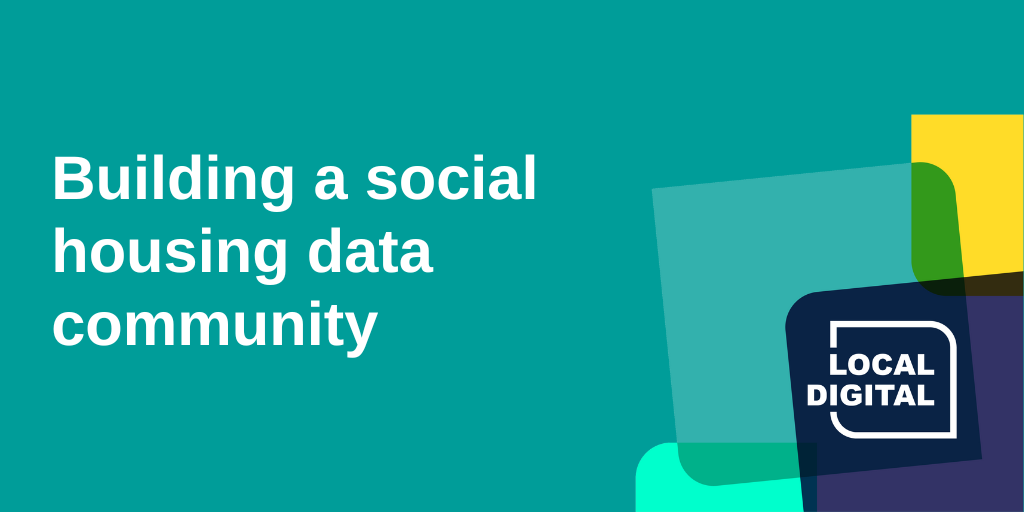
Building a social housing data community
In our last blog post, we shared our plans to build a social housing data community. We now have 2 working groups:
- housing providers (housing associations and councils)
- technology suppliers
Both groups have already held their first meeting, and will tackle some of the biggest data challenges in the sector. They will work together to:
- prioritise change
- fix data to provide quality, efficient services
- deliver positive outcomes for residents
Addressing the need for a data community
The Housing Association Charitable Trust (HACT) has created data standards for housing, but adoption across the sector has been varied. Despite the need for adoption, many barriers prevent housing organisations from applying data standards to their systems.
Our discovery report (pdf, opens in a new window) highlights that the cost of service inefficiencies caused by poor data is over £400 million per year in England.
Encouraging the use of data standards in social housing isn’t something one organisation can accomplish alone—it’s a collective responsibility of the sector. By building a community, we can utilise our shared knowledge and capabilities to make a greater impact.
Insights from our housing provider working group
We asked housing providers (councils and housing associations) to identify where changes could improve services for users and the feasibility of implementing these changes.
The areas prioritised were:
- responsive repairs and voids: fixing things quickly when they break in homes and getting empty homes ready for new tenants.
- capital works: big, planned projects like replacing roofs, upgrading kitchens, or improving energy efficiency in homes.
- asset management: keeping track of all the homes and buildings, planning maintenance, and making sure they stay in good condition for the long term.
- housing allocations and temporary accommodations: matching people to homes based on need and providing short-term housing for those in urgent situations.
The housing providers group identified some key points for shaping their next steps. These include:
- creating a culture that supports healthy data practices with top-down and bottom-up approaches and endorsement
- promoting a standards-based approach to finding a way to show the benefit of the change in data, taking a systems or service approach where relevant
Insights from our technology suppliers working group
Technology suppliers identified potential solutions that could meet the sector’s prioritised needs for responsive repairs, asset management, and housing allocations.
The agreed solutions were:
- API access standards to create guidelines for connecting systems that can share data securely and reliably
- standard or reference data models for consistency in data structure and formatting
- shared language and terminology with agreed words and definitions within the group
- taxonomy / hierarchy: a clear system for organising information and terminology into categories and levels that make sense
Technology suppliers highlighted MHCLG can support them by:
- balancing the effort, cost, and timescale for solution implementation
- dividing the data standards challenge into smaller, actionable components
A shared vision for the future
We asked both working groups to define a vision of a technology-enabled housing sector. Interestingly, their visions were broadly the same:
An innovative housing sector with a consistent data strategy backed by a culture that promotes the responsible use of data. Ultimately, this means better decisions, improved services and tenants who genuinely feel informed and in control of their homes.
Improving awareness and implementation is the first step toward the fundamental changes the sector needs.
Join the working groups and learn more
The working groups meet every 6 weeks to look at different ways to improve awareness and drive adoption of the most valuable data standards. For example: can we create a service that makes it easy to access and use HACT data standards for responsive repairs? What would that look like and what guidance is needed?
We’re looking for councils and housing providers who are ready to tackle their technology and data challenges to improve outcomes for residents and staff. Our goal is to bring together organisations from across England at different stages of digital maturity.
Categories: Blog posts , Data standards
Tags: Data standards, housing data, social housing
 UK Ministry of Housing, Communities and Local Government (MHCLG)
UK Ministry of Housing, Communities and Local Government (MHCLG) 
